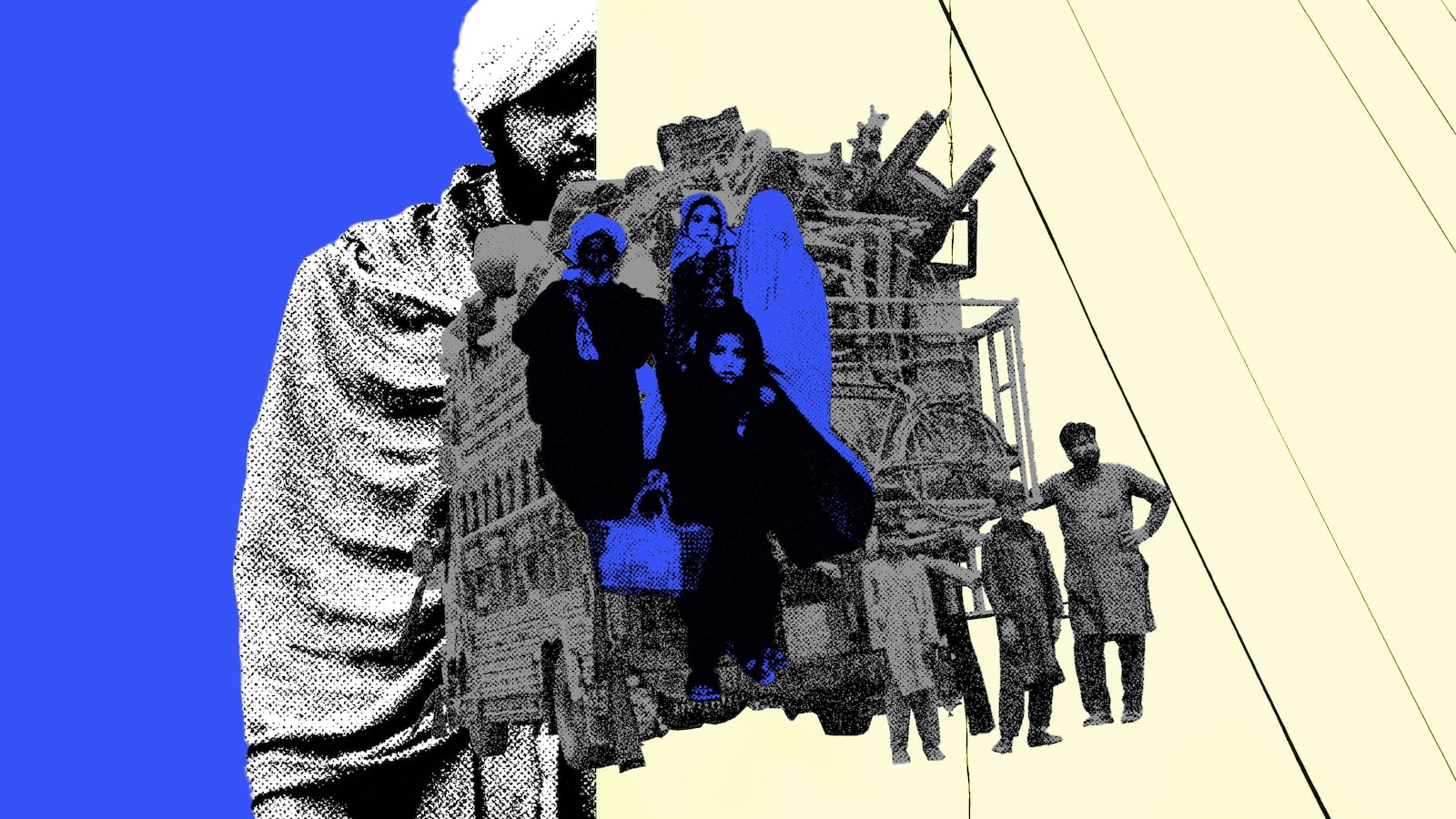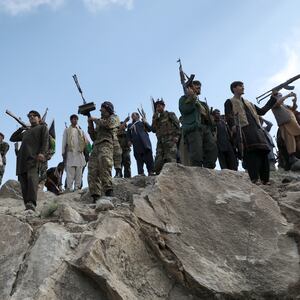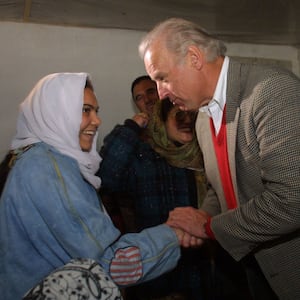TORKHAM, Pakistan—It is a hot and chaotic morning near the Durand Line of Afghanistan’s border with Pakistan, where thousands of travelers attempt to cross in and out of Taliban-controlled territory every day.
After a few grueling hours waiting in line, an Afghan family of five had just managed to cross the border into Pakistan, breathing a sigh of relief as they tried to flag down a taxi to Islamabad. The father, however, keeps looking back toward his homeland as his eyes swelled up with tears.
“Forty-five years of war, I couldn't avoid it nor the crisis a war brings,” Humayon Khan, a 60-year-old former government employee, told The Daily Beast. “Today, it is without war but also without a soul. Living with the Taliban is impossible, they have no respect for human and or Afghan values,” he added after getting into the cab.
Humayon Khan had seen it all: the Soviet invasion, the civil war, the American-led NATO occupation—but to him, life under the Taliban is the worst-case scenario.
“The Taliban leader, [Hibatullah Akhundzada] makes laws without any consideration of even the other Taliban members. He has a very narrow minded head,” Humayon said.
His wife, Hosna Sherzad, used to be a teacher. “In the last two years, I prayed that common sense would prevail… so that they allow girls and women to work, but having that hope hurts so I gave up,” the 55-year-old told The Daily Beast. “I wouldn't even wish it my worst enemy: to leave their beloved homeland the way we are.”
The couple’s three daughters described their life in Afghanistan after the Taliban took control as “hell for women.”
“I stopped going to school and I used to lock myself in my room till noon when the school was over,” the youngest daughter told The Daily Beast, speaking about her life under the Taliban’s regime through tears. “The Taliban do not know how to govern, they are barbarians who only rule by fear.”
Not everyone leaving Afghanistan in recent months is doing so to escape the iron fist of the Taliban. Droves of young Afghan nationals have been flooding into neighboring Pakistan with the purpose of joining the militant group Tehrik-i-Taliban Pakistan, as reported by The New York Times this week. The trend has raised concerns of a potential spike in terrorist activity in the region.

Afghan refugees stand in line to return home at a border crossing point of Torkham between Pakistan and Afghanistan in Nangarhar province.
Xinhua News Agency/Getty ImagesHomecoming
And although thousands are fleeing from Afghanistan, thousands more are flooding back—regardless of the restrictions on women’s education, economic turmoil, and collapse of institutions in the two years after the Taliban’s takeover.
That includes Asadullah Hazrat, an employee in Afghanistan’s Ministry of Education, who was returning from a month-long visit to Pakistan with his wife.
“I am happy and satisfied in Kabul under the IEA [Taliban] flag, the security is good, there were problems before and still now, but at least the occupation is over. Yes the girls do not go to school, but more important than that is that the war is over, the brutal American occupation is over,” he told The Daily Beast.
Hazrat added: “[Americans) were the aggressors, they wanted to westernize the most conservative country in the world, they were dropping their new bombs and using their new weapons as if we are rats that needed to be experimented on. It was good that they were defeated, they carpet bombed our nation mercilessly. Had they not invaded then Afghanistan would not have been so intellectually behind.”
Another Afghan crossing into Kabul is 50-year-old Sayad Jalal. He’s carrying Pakistani mangoes in a wooden box with one hand, and his six year old daughter in the other. After spending a week outside of the country, he said: “I cannot wait to feel the cold breeze of Kabul.”
“I have been a shopkeeper in Kabul for over 23 years, I will be honest, I feel much more secure under the Taliban regime than the U.S-backed government,” he said.
When asked about his children’s education, he said that “the boys are still studying but the girls are not, and I pulled them out of school in sixth grade before the Taliban regime came.” Jalal said he didn’t agree with the ban on girls from going to school: “Why did they close the schools for girls? I am not running away from my homeland, but their strictness is unnecessary. They should soften some of their policies.”

Afghan people arriving from Pakistan at the zero-point Torkham border crossing between Afghanistan and Pakistan.
Wakil Kohsar/Getty ImagesEsmat Qani, a prominent Afghan writer and political expert, told The Daily Beast he now thinks of his country as an “isolated island.”
“It has been two years, no formal recognition… Restricted trade, sanctions, tense relationships with neighbors, shut down schools,” he said. “The youth are running away, the leadership is camera shy. This is no real system, not one can define it properly.”
When confronted with the flurry of problems Afghan citizens like Qani have raised, the Taliban deputy minister of foreign affairs Muhammad Abbas Stanikzai told The Daily Beast that “Afghans should not despair.”
“Afghanistan is improving day by day, the issue of women's education is important and will be solved by priorities… The economy is not bad, America was advertising that Afghan people will die of hunger, thank God no one has died of hunger in the last two years.”







